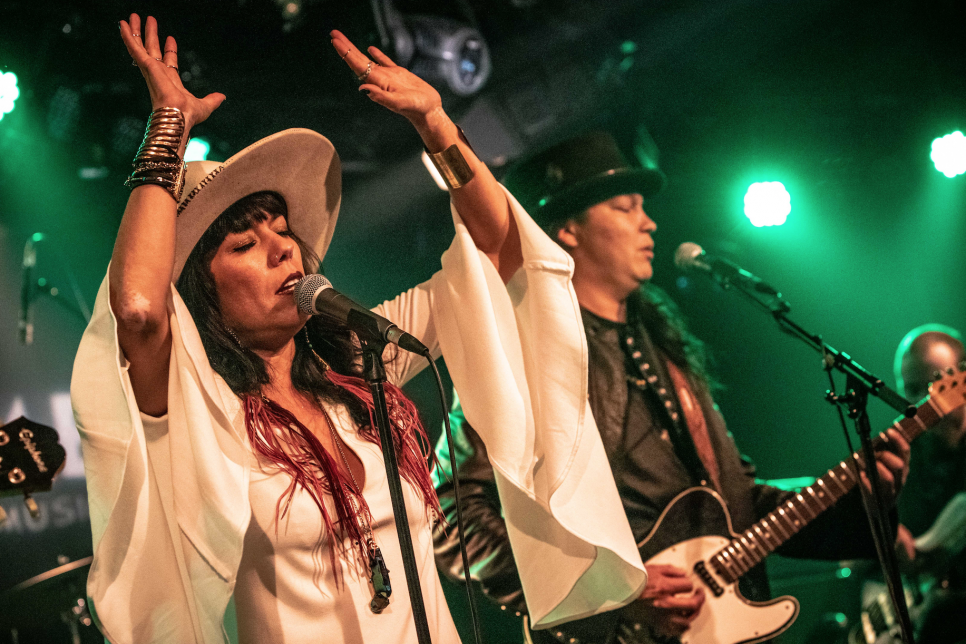On the eve of the Our Voice in the World Festival in the Old College, Aberystwyth, on 28-29 November 2019, Eluned Hâf - Head of Wales Arts International - discusses the place of Wales and the Welsh language in UNESCO's Year of Indigenous Language.
In the light of Welsh Government’s imminent International Strategy and of course in the context of Brexit, many companies and artists in Wales have been busy revising their own international strategies. The creation of Eluned Morgan’s roles as the Minister for International Relations and Welsh Language has grown an international interest in the experience, resilience and transmission of the Welsh Language, and how the arts thrive in a multi-lingual culture. The Welsh language and our music undoubtedly gives Wales a unique tone of voice and character in the world.
The 'Our Voice in the World' event in Aberystwyth this week is very timely, and as part of the UNESCO Year of Indigenous Languages 2019 it’s a privilege to present 'Mamiaith', a collaborative international exchange programme featuring Georgia Ruth, Jordan Price Williams, Doimnic Mac Giolla Bhríde, Lauren Ní Chasaide and Rona Wilkie,.
This is one of a large number of international events this year discussing linguistic resilience as part of the UNESCO Year. With 6,000 to 7,000 of the world's languages under threat, no wonder.
In October, I was lucky enough to take part in such discussions at the inaugural Indigenous music conference at WOMEX 19 in Finland. I was as inspired by the music, as I was distressed by ongoing human rights abuses in indigenous communities and particularly shaken by my own lack of awareness of the ongoing impact of cultural colonisation of indigenous people around the world. A reoccurring theme was around women's rights and how, to this day, indigenous women, and mothers in particular, are targeted as cultural colonisation intensifies. Mamiaith (mothertongue) is a tribute to all women and mothers who have given us our mother-tongues.
'Make space and stage' is the overwhelming message when discussing the extinct languages of the world. 'Make space at the table for representatives of native languages and cultures; put our music and languages on your festival stages, was the plea of artists - one after the other.
This year, WOMEX made space at its table by appointing the first Official Selector of indigenous descent, the Maori Hinurewa te Hau. Along with Canadian singer ShoShona Kish of the Anishinabekwe Nation, a former WOMEX Professional Excellence Award winner and one of this year's performers, there was now a broad platform for the world's indigenous languages.
According to ShoShona Kish: "We are the dream of our forefathers, and we dream of our great-grandchildren"
The space created at WOMEX for indigenous languages is in part testament to international efforts to give minority languages a more prominent place at major events. We are proud that our efforts in putting the Welsh language, and other smaller languages, at the forefront of the WOMEX in Cardiff in 2013 are bearing fruit.
Cultural Colonisation?
Within Wales, we understandably don’t regard the Welsh language as a colonising language. But in hearing one of Australia’s First Nations artists sing about 'Hopkin River', we are reminded how Welsh names have replaced indigenous place names around the world. But, by not calling out our past colonising efforts of other cultures, aren’t we perpetuating a cultural colonisation? In Canada, the US or Australia Welsh, Scottish and Irish music and cultures (if not languages) have flourished since the mass emigration of the 19th Century.
Should we not at least recognise the continued privileges our cultures have in ex-Colonies from Canada to Patagonia, from Hong Kong to New Zealand? Should we too not support a growing campaign for cultural reparations for the world's indigenous cultures.
As Wales is the first country to make culture and language a statutory part of sustainable development as well as a global responsibility, do we, like the rest of the United Kingdom, have no such responsibility?
As a Welsh woman and a global citizen, I am proud of the Well-being of Future Generations Act Wales, its social values and far-reaching objectives. The title of the Act, incidentally, comes from the North American First Nations philosophy, which takes into account the impact of today's decisions on people seven generations into the future when making daily choices.
As we prepare culturally to leave the European Union, the need for intercultural collaboration does not diminish. Just the opposite: there has never been such a need to engage with international networks of all kinds, for the benefit of future generations.
What will my great-great-grandchildren think of the decisions we make today? In what condition will the world be? How many of my descendants will have learned from our mistakes? Will they remember the old language and sing the old songs?
It’s time to put their future into our present plans.

